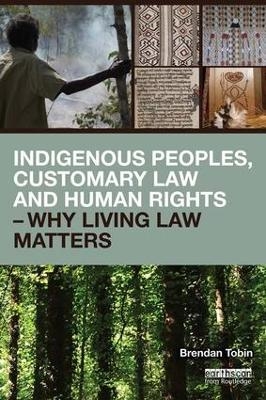
Indigenous Peoples, Customary Law and Human Rights - Why Living Law Matters
Routledge (Verlag)
978-1-138-67171-3 (ISBN)
This highly original work demonstrates the fundamental role of customary law for the realization of Indigenous peoples’ human rights and for sound national and international legal governance. The book reviews the legal status of customary law and its relationship with positive and natural law from the time of Plato up to the present. It examines its growing recognition in constitutional and international law and its dependence on and at times strained relationship with human rights law.
The author analyzes the role of customary law in tribal, national and international governance of Indigenous peoples’ lands, resources and cultural heritage. He explores the challenges and opportunities for its recognition by courts and alternative dispute resolution mechanisms, including issues of proof of law and conflicts between customary practices and human rights. He throws light on the richness inherent in legal diversity and key principles of customary law and their influence in legal practice and on emerging notions of intercultural equity and justice. He concludes that Indigenous peoples’ rights to their customary legal regimes and states’ obligations to respect and recognize customary law, in order to secure their human rights, are principles of international customary law, and as such binding on all states.
At a time when the self-determination, land, resources and cultural heritage of Indigenous peoples are increasingly under threat, this accessible book presents the key issues for both legal and non-legal scholars, practitioners, students of human rights and environmental justice, and Indigenous peoples themselves.
Brendan Tobin (Ashoka Fellow, Ashoka Innovators for the Public) a Research Fellow at the Law School, Griffith University, Australia, has over 20 years of experience working on environmental law and human rights around the world. He has previously been a lecturer at the National University of San Marcos, Peru, a researcher at the United Nations University, Japan. As a legal consultant he has worked for a range of clients including the World Intellectual Property Organization and Central University of Minorities in Beijing, China. He was the Coordinator and Founding Member of the Asociación para la Defensa de los Derechos Naturales (Association for the Defence of Natural Rights) based in Peru and an NGO representative on the Peruvian national delegation to the Convention on Biological Diversity. He has a PhD from the Irish Centre for Human Rights, National University of Ireland, Galway, and practised as a barrister in Dublin, Ireland. He holds dual Irish and Peruvian citizenship.
Introduction 1. Customary Law in Context 2. Self-Determination in Practice 3. Where Custom is the Law 4. In Search of the Living Law 5. Ancestral Rights Recovered: Lands and Traditional Territories 6. Natural Resources or Essences of Life? 7. Right to Culture and Cultural Heritage 8. Traditional Knowledge 9. Intercultural Equity and Justice In Closing: Traditions for the Future
| Erscheinungsdatum | 02.04.2016 |
|---|---|
| Reihe/Serie | Routledge Studies in Law and Sustainable Development |
| Verlagsort | London |
| Sprache | englisch |
| Maße | 156 x 234 mm |
| Gewicht | 453 g |
| Themenwelt | Naturwissenschaften ► Biologie ► Ökologie / Naturschutz |
| Naturwissenschaften ► Geowissenschaften ► Geografie / Kartografie | |
| Recht / Steuern ► EU / Internationales Recht | |
| Recht / Steuern ► Öffentliches Recht ► Umweltrecht | |
| Recht / Steuern ► Öffentliches Recht ► Völkerrecht | |
| Sozialwissenschaften ► Ethnologie | |
| Sozialwissenschaften ► Politik / Verwaltung | |
| Sozialwissenschaften ► Soziologie ► Spezielle Soziologien | |
| Technik ► Umwelttechnik / Biotechnologie | |
| ISBN-10 | 1-138-67171-1 / 1138671711 |
| ISBN-13 | 978-1-138-67171-3 / 9781138671713 |
| Zustand | Neuware |
| Informationen gemäß Produktsicherheitsverordnung (GPSR) | |
| Haben Sie eine Frage zum Produkt? |
aus dem Bereich


